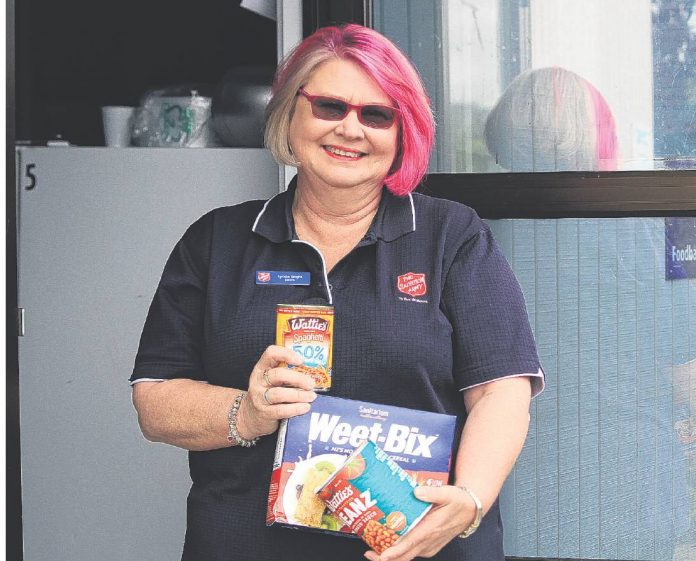
The need for help from South Canterbury foodbanks and budgeting services is increasing as families struggle to make ends meet amid rising costs.
All social agencies spoken to reported an increase in the number of people seeking help, including two-income families and those who had never had to access their services before.
Presbyterian Support South Canterbury has tracked the data it keeps on its foodbank and found a significant increase in food parcels.
Presbyterian Support South Canterbury chief executive Carolyn Cooper said the foodbank run by its Family Works service showed an increase over the past 12 months.
‘‘As a comparison, for the entire year in 2017, we gave out 298 food parcels. For the entire year for 2022, over 1400 food parcels were given out.’’
She said it was no longer just families on benefits who asked for help, it was now families in the working middle class.
‘‘A significant number ring in and apologise for having to need to ask for help as they have never needed it before.’’
Some people managed to get through Covid-19 without help. Ms Cooper said.
‘‘But they or their children are sick again and they have no more sick leave and therefore no wages, which is becoming an increasing issue.’’
Another situation the organisation has come across is families who have incurred a significant expense and are struggling to pay for it within their tight budgets.
‘‘We often see people asking if we have vegetables or fruit, something we never used to be asked for, or a little meat, and we have also had an increase in requests for help with petrol.’’
She said the support she was talking about did not include Covid-19 support or Christmas support that happened during the holiday season.
‘‘Foodbank is reliant on grants, money donations and donations of food items from the community.’’
Salvation Army Corps Envoy Lynda Bright said it also saw an increase in client numbers.
‘‘It is a changing demographic. It is not just single mums or people on the benefit who are coming to us for help, there are people who are a part of the working class and those who are self-employed who are asking for help.’’
Mrs Bright said there were families in which both the mother and father were working but they could not afford to support themselves and their children.
‘‘People cannot afford food and fuel. Devices for school as well as stationery, school shoes and school uniforms also cost a lot and have been in high demand.’’
They did not give out cash but could help families get the necessities and they could advocate with other agencies, Mrs Bright said.
‘‘We have a good list of people who can also help and we want to be helping people in our community. It is sad that families cannot afford things; we don’t want people to just make do.’’
The organisation also provided recipes and suggested for people to share the cost of food, such as going halves on a whole pumpkin, she said.
‘‘We do not want people to feel bad about coming in and approaching us. It is not their fault, we know you work hard.’’
Timaru Budget Advisory Trust manager Sheree Sadler said it had seen a significant increase in demand for its services in the last few months.
‘‘We have also seen a change in the people that come to see us. There are more people with what was once deemed high incomes struggling to sustain the lifestyle they are used to and want to make changes to their spending habits.’’
The trust was also seeing clients come in who had used ‘‘buy now, pay later’’ facilities to get through the pressure of Christmas and back to school and were now struggling to meet repayments.
‘‘The rising living costs are affecting all of our clients. The cost of fuel and groceries have more than doubled for some of our families we are working with, but their benefits or wages aren’t increasing enough to cover the substantial increases.’’
She said the trust was working with several families with two incomes who were still struggling to make mortgage payments or rent increases.
‘‘I urge anyone who feels they are struggling to come and meet with one of our financial mentors. Don’t put off asking for help, as it could get you into further financial hardship.
‘‘We are a free, confidential and non-judgemental service. Get in touch today via email, text or a phone call to make an appointment.’’
The Government’s number one priority was the cost of living and ensuring hardworking New Zealanders — particularly families — could live and thrive, Labour Rangitata MP Jo Luxton said.
‘‘That’s why we’re providing extra cost of living support to families and businesses in Rangitata, and across the country.’’
She said that as a local MP, and as a Government, they heard about many families struggling, and they knew people were worried about paying their grocery bills and their mortgages.
‘‘We have announced that we’re extending our fuel tax cut and our reduction on road user charges until the end of June. We know that transport is one of the biggest expenses for households and reducing that cost is one practical way we can quickly ease some of the pressure that New Zealanders are facing right now.
‘‘On top of that, slashing transport costs helps to reduce the fuel burden on businesses
— keeping the cost of food and essential goods lower across the board, which is good for everyone here in Rangitata.’’
There was more that they could do, and as Parliament resumed the Government focus would be on bread-and-butter issues, she said.
‘‘In 2023, we want to keep growing a strong economy so Kiwis can get good jobs, we can lift incomes and create opportunities for people to get ahead.
‘‘We’ll keep working hard to strengthen core public services like health and education, and my offices will continue to help people in Rangitata to access this support wherever possible.’’




